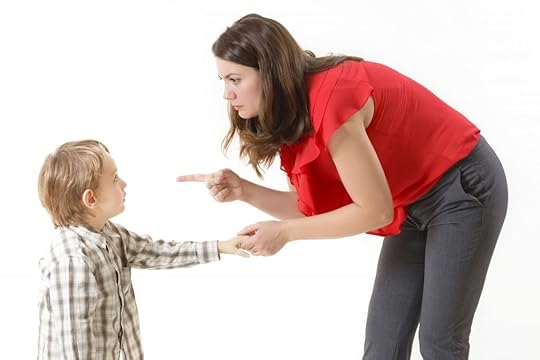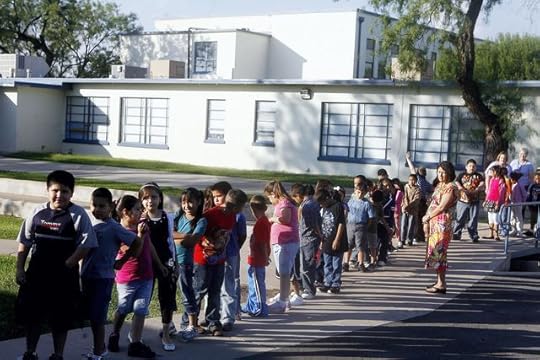Roma Khetarpal's Blog, page 12
March 13, 2018
March For Our Lives

Tomorrow, March 14, is #Enough National Walk Out Day.
This national call for students, teachers, school administrators, parents, and allies is to join a peaceful protest to support stricter gun control measures. It is time to stand with our children to enact change so these tragic shootings can be prevented once and for all.
The #NationalSchoolWalkout will be held at 10:00 a.m. for 17 minutes (to honor the 17 lives that were lost at the Stoneman Douglas High School in Parkland, Florida). Many high schools and colleges are supporting their students and we encourage you, as parents, to take part as well.
The Los Angeles Unified School District has posted guidelines for the day, as they have special activities planned ON campus so the students can remain safe within the school boundaries.
To find a march in your area, check out womensmarch.com.
We will also be having a local “March for Our Lives”, here in the Los Angeles area on March 24 to support the Parkland students.
We are encouraging you to participate tomorrow at 10:00 a.m by saying #ENOUGH!
I’ve expressed my take and views on this issue in this blog post. It’s time to take action!
The post March For Our Lives appeared first on Tools of Growth.
March 7, 2018
Parenting: Busy as a Bee
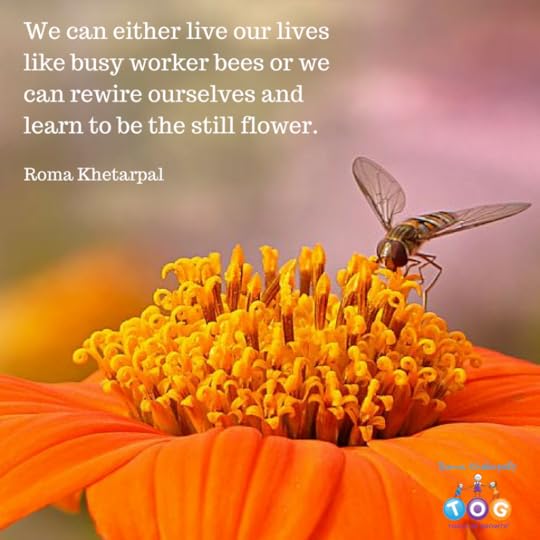
I was sitting outdoors last weekend, and a bee caught my attention. As I saw it buzzing from flower to flower, I couldn’t help but wonder what it must be like to be a bee. Gathering pollen from one flower and dropping it to the next, bees seem to be on a mission to get the job done. I had a question, however, “Is the job ever done?’
That reminded me of the tasks that we take on in the name of parenting: drop-offs and pick-ups, groceries, school projects, laundry, after-school activities, and dinner prep. Moving from one task to another, we are as busy as bees—often not even completing what we started out to do. Any free time that we have we gladly spend in the company of our friends on social media. And that often leads us to ponder how others are doing with a “lucky them” or “why not me?” train of thought.
Along with all the tasks on our agenda, according to a report by Common Sense Media, we, the parents of children 8-18, are spending an average of nine hours on screen time. Even a conservative 4-5 hours on our devices means we must be dropping a lot of things off our to-do lists. We are no longer as busy as bees… we are actually busier!
Eventually, the kids come home from school. And all those tasks that we didn’t get to during the day are added to unexpected occurrences—a homework assignment, a sick kid, sibling wars, and so on. Where does that leave us? Stressed, anxious, impatient, intolerant, angry … basically with a short fuse triggered by the slightest normal kid behavior. Our out-of-control feelings then spin off into a need to control our children. After all, they should comply and listen and respect our wishes because we are their parents. We also claim that whatever we do, we do for their own good, because we are their caretakers, guardians, stewards, well-wishers and any other authoritative description we can think of.
Parents, it’s time to rethink this. It’s time to start being really responsible by looking carefully at how we are dumping our emotional overload onto our kids. We know that we are all doing this in more than one way. The big question then is: How do I fix this? Where do I start? Well, If you’re honestly and authentically committed to changing things, I will start you off with three easy tips…
Visit reoccurring battles and the time that they occur. If the trigger is starting homework or getting to bed on time, how do you show up at those times? Are you impatient, aggravated, feeling like you just had it? The emotion that you’re feeling is what the kids will mimic back to you in their behavior. So take a deep breath, self-regulate, shift your own energy, and then move to directing the kids.
Say you’ve already spent a week successfully redirecting your own energy and you’ve been showing up consciously, mindfully, authentically, calm, and patient … and yet your child won’t brush his or her teeth, or whatever. Well, habits take as long to break as they take to make. So give it that time. And remember: Your child will mirror your behavior. So be patient and believe in yourself and your child.
Take ownership of how you show up: There will be times when you are tired, overwhelmed, and beaten. Recognize that; accept it. Stop buzzing like a bee and take some time to feed your soul. Honor yourself and your existence. You are not supposed to experience life on a hamster wheel. Stop and smell the roses. Be silent and allow your inner chaos to settle and move through your body. That should take only 90 seconds if you break the cycle of hitting repeat on your repetitive thoughts. Remind yourself that ….
You don’t have to parent, you get to parent! Focus your awareness and attention on this truth every single day. What throws us onto the hamster wheel— besides trying to get things done in a time crunch—is our attitude, our complaints, our feeling that something is missing. Life is abundant, there is plenty of money, happiness, joy, and, believe it or not – even time to go around! We are just focusing on the wrong attitude. And, as we know, anything that we put our attention on long enough becomes our reality. That’s what shows up in our life. Parenting is a unique gift of growth. It’s an invitation for us to learn more about ourselves and how we behave when we hit obstacles.
So take a moment and think about that when you are buzzing around as busy as a bee. We are not bees! We have been given the gift of human life to live to our fullest potential joyfully. How can we inspire our kids to use this gift if we don’t know how to harness it ourselves? We can either live our lives like busy worker bees or we can rewire ourselves and learn to be the still flower. We too can bloom every morning and blossom through our days. We owe this to ourselves and to our children.
In Joy,
Roma
The post Parenting: Busy as a Bee appeared first on Tools of Growth.
February 23, 2018
Just One Minute A Day Dedicated To #Parkland. Are You In?
Yes, I’m here to talk about the shooting in Parkland, Florida, last week. I know everyone has heard enough gut-wrenching details about this unwarranted loss of 17 children and teachers whose faces their family and friends will never see again. That’s not to mention the 14 injured who will have to live the rest of their lives wondering “why not me?” Hopefully they’ll someday find healing in the gratitude of being alive to live a life that can never be the same after experiencing such trauma at a young age.
Listening to the media coverage, it is clear that this “gunman” or “shooter” —as they referred to him before his name was released—was facing a deep-rooted mental illness for a few years. Police records show a slew of calls that they made to his home for various incidents that suggested that he was not just a threat to the public but also to himself. Clearly, the system failed us yet again.
Yes, he should have been treated and the authorities should have responded mindfully and appropriately during the several opportunities that they had.
Yes, we need more gun control in our country. How can we have a medical diagnosis like this and yet not thoroughly investigate the possession of weapons?
Yes, our government representatives need to separate their interests from that of the NRA.
Sure, we need more security in our school systems—though I’m appalled to think that we are living in a time where this has become a leading issue.
And, of course, we need to support families who are faced with these kinds of life-altering losses.
But I’m not sharing anything you don’t already know. I can’t believe that my last post about Sal Castro Middle School’s shooting was just two weeks ago! Seriously!
In my opinion, gun control and the NRA must be addressed by all of us—as a community. There’s been enough dancing around this issue in the protection of people’s political and financial interests. Yet most of us have gone back to our daily lives and are left with the news updates that we watch as part of our routine.
I’m suggesting something else: Let’s not be passive about this. The next victim could be one of your—or my— children. It is our social responsibility to keep this dialogue going.
Of course we are all busy. But surely we all have one minute per day to share a post or comment or “Like” it on Facebook or Instagram or to “Like” or “Retweet” it on Twitter. Here’s an easy roadmap:
Educate Yourself. Inform yourself about what’s going on. Here are two links to helpful articles.
https://www.nbcnews.com/news/us-news/students-seize-control-gun-debate-plan-walkouts-march-n849226
https://www.cnn.com/2018/02/19/us/florida-parkland-shooting-marches/index.html
Get Involved for just one minute a day! Look at these petitions and sign up. You owe it to your kids:
https://petitions.moveon.org/sign/gun-control-now
https://www.change.org/p/congress-pass-common-sense-gun-control
Follow the marches on March 14 and March 24 and share links to them. You can join one in the Los Angeles area.
#ENOUGH on March 14:
This is a national march calling for students, teachers, school administrators, parents, and allies to take part in a #NationalSchoolWalkout for 17 minutes at 10 a.m. on March 14, to protest congressional inaction.
You can also follow them on Facebook.
Follow #ENOUGH on all social media handles for updates on marches in your city.
“March For Our Lives” – by Parkland Students on March 24:
Students and survivors of #Parkland shootings are marching to echo a collective outcry to Washington demanding stricter gun control.
We’ve all heard the sayings: It takes a village to raise a child, and there is no greater pain than to bury one. Well, it’s time to be the village that can help, obviously not in raising the children we have lost but in raising the vibrational energy of their memory. This can help alleviate the pain that the parents who have buried their precious ones are feeling. The combined community efforts suggested above will reassure them that the loss of their one child will bring about a safer life for 50.7 million other school children. Personally, I would die for that in a heartbeat.
We are asking you for just one minute a day for #Parkland. Are you in?
The post Just One Minute A Day Dedicated To #Parkland. Are You In? appeared first on Tools of Growth.
February 12, 2018
Kids Not Listening? FOUR Reasons Why!
There are tons of things we all say to our kids that keep us connected and help nurture them. Phrases like “believe in yourself,” “you can do anything,” or “ I’m so proud of you.”
Our children are being raised in a world where positivity is in the air they breathe! Through positive psychology, affirmations, and positive thinking, our kids are being brought up to understand how the mind and manifestations work. What we think repeatedly is what shows up.
Very much aligned with thinking and manifestation are the words that we use. Yet the correlation is not simple. Often people wonder why they are thinking or talking positively yet not getting the results that they were hoping for. This certainly applies to parenting.
We may think positively about wanting a great relationship with our kids and speak to them with kindness and respect but not get the results we expected. For example, how many times have you said something nicely to your kids like, “Don’t touch the TV with your dirty hands, my love,” and gotten more dirty handprints on the TV screen? How many times do we say in our kindest voice, “Sweetheart, you need to brush your teeth. It’s bedtime,” only to have it fall on deaf ears, and produce total chaos before they tuck in for the night?
Well, here’s why. Certain words and phrases—even when spoken in a kind voice— trigger a negative emotion. So even though you are thinking positively and are using a positive tone of voice, the word choice creates a negative impression in your child’s mind. In other words, the message received by our children’s brains—triggered by certain words—is making a negative impression, and then the unwanted behavior follows.
Here are some examples of words we commonly use that lead us to disconnection instead of connection:
• DON’T do this … We hear “don’t” and automatically get defensive. Our kids feel the same way. That’s not all: What if I asked you to close your eyes, listen carefully, and follow this command: Don’t think of a red fire truck! What are you going to think of? A red fire truck, right? This is how we are wired! The first impression in our brain of a “Don’t” command imprints an image of exactly what we don’t want. It becomes a two-step process then to think of a different color truck. Kids’ brains—especially those of our younger ones—are not wired to figure out what “to do” instantly. This comes as their brain develops. So tell them what to do instead of what not to do.
• You NEED to… When we say “you need to do this,” it’s like hearing “you don’t have a choice. Humans—especially little ones—don’t like to be told that they don’t have an option. We resist authority or being forced. So, like the command “don’t,” this one falls on deaf ears as well!
• You NEVER… This sends the message that something (not listening, for example) is a repeated behavior, and therefore “you are a problem for me,” or “you have a problem.” That shames kids and makes them feel less than ourselves. We all know how we respond when we are shamed. We shut down. To get through to kids when they are shamed, we have to first get through the cloud of emotion caused by the words “you never.” So why use words that are not conducive to effective communication and connection?
•You ALWAYS… This sends a similar message to the one above. It’s actually a phrase that frequently follows “you never.” (Think of “you never listen to me. You always do whatever you want.”). Needless to say, the emotions of shame and “I’m not good enough” guide our children’s reaction and behavior to this phrase. Deleting these words altogether from your vocabulary will really align what you say with your good intentions of connecting with your kids and will teach them to respond positively.
Imagine hearing these words every day! It is no surprise then that kids will react to them and not respond. It is our job to teach our kids about wrong behavior, but learning must be a positive experience, not a negative one. That means all the way from our thinking to our expressions—words, body language, and tone of voice.
Instead of the words above, why not say things like:
What if we did it this way?
How about something like this?
Why don’t we find another option?
Let’s think about that.
The next time you find yourself needing to change a behavior, think about the way you align your words to match your positive intentions and turn a challenging situation into a positive learning experience for your kids. Keep in mind that this kind of verbal rewiring—for both parent and child—will need some practice. The results, however, will be well worth it.
If you have other suggestions of positive instructions for children or can relate an instance where you turned a negative behavior to a positive one by rewording your direction, do share that with us under comments here or on our Facebook page.
The post Kids Not Listening? FOUR Reasons Why! appeared first on Tools of Growth.
February 2, 2018
Talking to Kids About School Shootings
Yesterday we turned on the news to learn of another school shooting, this time very close to my home, family, and friends. With so many recent school shootings—more than a dozen so far in 2018—it is clear this is happening all too often, and frightening to think that our children may feel that this is becoming the norm.
Your children may have questions that are hard to respond to: Why would someone do something like this? Will this happen at my school or to me? Are we safe at school? While there are no easy answers to these questions, being aware and addressing your children’s fears and concerns is imperative to their physical and mental health. By focusing your attention on what has happened and discussing it honestly and openly, you can help ease their fears and anxieties about their own safety.
These tips can help guide you through discussing this tragedy with your kids, and help you to handle it as well.
Begin a Mindful, Open Discussion: Let kids know that, unfortunately, bad incidents do happen. Find out what your child knows about the event; his or her perception of what has happened may be very different from reality. This article at Today.com gives an age-by-age guide on how to talk to your children about these tragedies.
Don’t hesitate to admit that you don’t have all of the answers. If your child asks a question and you don’t know the answer, the simplest reply might be something like, “I’m sad about the news, and I’m worried just like you are. I love you, and I’m here for you.”
Encourage Your Family to Express Their Feelings: You can complete a Dealing with the Feeling (Spot it, say it, okay it) exercise to open up dialogue. Younger children may not be able to express their feelings about “violence,” but they can discuss how they feel when a classmate is mean to them, and you can get at that with open-ended questions. Share how you feel about school shootings so that your children know that what they are feeling is normal. Don’t be afraid to show your emotions (crying, sadness, shock) as well.
Discuss Mindfulness With Your Children: Mindless events like school shootings are caused when we do not understand what our inner world looks like. They come from a complete disconnection from oneself and our innate human values of goodness and oneness. Make sure to help your kids develop problem-solving and conflict-resolution skills and to avoid (and report) bullying and other negative communication with peers.
Make Sure Your Kids Feel Safe and Secure: Our children are looking to us for safety. Avoid information overload by limiting their exposure to the disturbing content that they may see on TV or the internet. Also be mindful of conversations that you may be having with other adults when the kids are in earshot.
Make your kids aware of the fact that school shootings are not common, and stress that schools are safe places. You may even want to discuss school safety procedures to make sure that your child understands what to do in certain situations.
Raise the Level of Self-Awareness and Connection: There are many ways for both adults and children to relieve stress and anxiety. Stick with your normal routine, and do not become fixated on news and updates about the tragedy, which can cause you stress that your children will notice. Teach your children meditation or breathing exercises that they can use if they are feeling overwhelmed.
Be mindful of their body language and cues. Every child will respond to trauma differently. If you feel that something is bothering them, always ask. After a few days, signs of anxiety (excessive worrying, refusing to go to school, sleeplessness, nightmares, headaches, or stomachaches) might suggest that a child needs more assistance in dealing with their feelings.
Reach Out and Offer Your Help: When something so massively damaging happens, human compassion increases tenfold. Teach your children that healing is best expressed through acts of connection, kindness, and compassion. Let your child know that when bad things happen, the world is full of good people who want to help. You can ask your kids for ideas on how they may be able to help the survivors. From fundraising and collecting donations to sending a handwritten note to show support and love, there are many ways that your child can show compassion.
Learn more from Roma about talking to kids about violence at Tools of Growth and 30Seconds.com.
The post Talking to Kids About School Shootings appeared first on Tools of Growth.
January 24, 2018
Reverence For Parents
First published in the Huffington Post.

“Love your parents and treat them with care, for you will only know their value when you see their empty chair.”
That was a quote I first came across when I was a newlywed and had just moved to the United States, leaving my parents behind in Kuwait, where I grew up. Time and time again, I would read this quote and reflect on whether or not I loved my parents and treated them with care. The answer was always affirmative. Even though I had moved far away from them, my feelings were clear to both my parents and me. I was quite confident of that.
Two years later, a coworker whose background was totally unlike mine lost a parent, and when I took her to lunch to try to lighten her mood, we got into a deep conversation about her parents.
“I was never really close to my dad,” she said. “I don’t know why I’m feeling so sad and down. He never spent a whole lot of time with my sister and me. He left my mom when I was only 4 and didn’t really look back ― even during the holidays. As a teenager, I would secretly wish that he were dead, so I didn’t ever have to think about him again. You know that quote, Roma, ‘Love your parents and treat them with care…’ doesn’t hold true for most Americans. I don’t have a single friend who ‘adores’ her or his parents. What is your relationship with your parents like?”
Not wanting to hurt her feelings by rubbing the adulation I had for my parents in her face, I gave her simple answers: “It’s great for the most part. Of course, we don’t see eye-to-eye on a lot of things, but they’re always there for me.”
“You have a hard time talking bad about your parents, I can see,” she said. “I actually admire that about your culture.”
Was it “my culture?” I remember pondering. Love for parents is not cultural, per se. We don’t love our parents because it’s part of the culture. I completely disagreed with my friend but didn’t think it was the right time to open up a debate.
As the years went by, I, my husband and our children were surrounded by both sets of parents and siblings. Our parents were always there for us and their grandkids, and we did what we needed to do for our parents without giving “culture” much thought. I was a firm believer of “what you put in is what you get out,” and I didn’t think that culture had much to do with it.
This issue came to mind again on a recent family wedding trip to India. When we got the invitation, our entire family in the U.S. couldn’t help wondering, “why hold a wedding in the summer?!” With temperatures at 110 degree-plus and 90 percent humidity, no one was excited about attending a summer event in New Delhi. Within a few days, we had a message from a cousin in Delhi who told us that the bride’s elderly grandmother was unwell, and the girl wanted to have her wedding as soon as possible so the older woman would be part of the festivities. We were all touched by the gesture.
When we arrived in Delhi, we also found that all the rooms in the wedding house had been assigned to elders from out of town, whether they were close family and friends or not. Those guests had the comforts of homemade meals and in-home assistance, regardless of their relationship to the families of the bride or groom. And no one—not even those of us who had traveled from the U.S.—complained or even commented. We were all in a hotel and were completely fine with that.
Right before the wedding, a number of us hiked to a temple in the Himalayas. On the way, I couldn’t help but notice, once again, how many people were escorting their parents, who were young, old, disabled or in wheelchairs. I even saw a 25-year-old carrying his elderly, frail grandmother on his shoulders. As we all cheered him on, he just shrugged his shoulders and said, “Her last wish is my command.”
Once the wedding started, all the ceremonies, rituals and traditions commenced with the blessings of the elders. I know this is common throughout the Indian culture. In fact, every wedding invitation is extended by the elders in the family. Even if they are deceased, their names go on the invitation.
On our way back to Los Angeles, I saw another example of this mind-set in the way a Korean family traveled with their elderly father and grandfather. First the husband sat next to the gentleman in order to take care of him. Later the wife took her turn, and they switched back and forth between their kids and the older man. The kids would come over to give their grandpa a hug or just keep him company every chance they got. The six-year-old girl kept asking him, “Are you ok, Grandpa?”
Clearly, our culture does play a big role in how we honor, celebrate, and respect our parents. As South Asians, we should be very proud of this rich heritage: They are made to feel that they are still heads of households even when they have given up those responsibilities. Before big decisions, parents are consulted and informed so they feel like they are still part of the family. Their experience and wisdom is valued and respected. Placing elders in care facilities is still highly uncommon in our culture; we do not consider taking care of our parents an obligation or a duty, it is our responsibility. We take care of them because we have to—actually, because we get to—and we consider it a privilege.
This can definitely be hard and challenging. I should know. I have lived with my mother-in-law for 30 years now. And yes, this infringes on our lifestyle and invades our privacy, as our parents’ care for us undoubtedly infringed on their lifestyle and privacy when we were growing up. But what we learn from being around our elders is priceless. Because of my mother-in-law’s presence in our household, we are all more empathetic, compassionate, and kind. Those are values that we all know are best taught by example and life experience.
In our South Asian cultures, we do not just have respect for our elders, but we also have a certain reverence, piety, and devotion for them. And that is a value to be proud of and worth passing along to our future generations.
The post Reverence For Parents appeared first on Tools of Growth.
January 16, 2018
Are You a Good Influence On Your Kids?
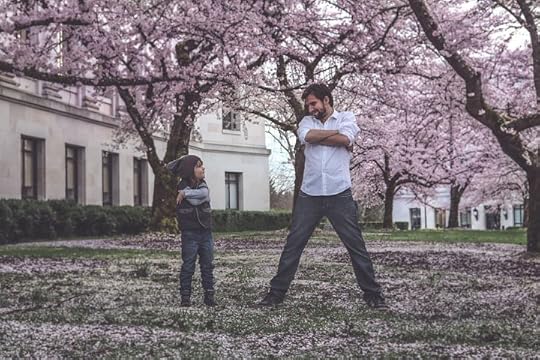
We’re often quick to let our children know what company they should keep and who might be the “bad” influences on them. As kids get older, they have a tendency to emulate peers who might dress controversially or behave inappropriately. What we seldom realize, however, is that we are the ones who, first and foremost, end up shaping the adults our children become and who influence most the choices that they make. So what defines “good” parental influence?
We all want to raise kids who know who they are—their personality traits, their own weaknesses and strengths—so that they can make good choices when faced with curiosity and temptations. In order for them to learn this life-enhancing skill, we have to commit to being conscious and mindful in the day-to-day choices that we make while raising our children. But what does that look like in daily life?
Here are three life habits we must master if we want to be a “good” influence on our kids:
1. Take frequent trips inward to reflect on what you value that has been passed on to you from the adults in your life and take a personal inventory of what you do not value and do not want to pass on to your kids. The first part is easy. If you were influenced by parents or adults who were kind and compassionate, those lessons are part of who you are and what you will be proud to pass along to your kids. However, each of us carries baggage from our childhood that has not served us well; that is the self-reflection that we also need to focus on. These habits may be buried deep in our subconscious, but they will nevertheless show up in our lives.
Read the full post HERE.
The post Are You a Good Influence On Your Kids? appeared first on Tools of Growth.
January 12, 2018
Parenting Audit Part 2 – Tips and Tools
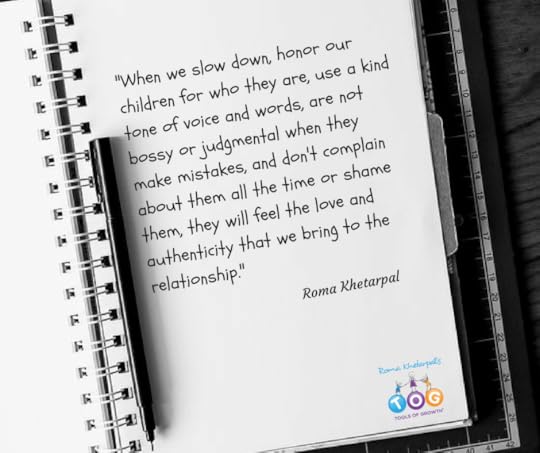
Last week we gave you a half-dozen questions so you could do your own 2018 Parenting Audit. This week I’m excited to share some perspectives, tips, and tools to help you get through some of the not-so-great moments of raising kids, so 2018 can be a more enjoyable parenting year for you.
What is the speed of life in your household?
– Slow and calm?
– Relaxed or rushed?
– Always busy and overscheduled?
If the speed of life in your household is always slow and calm, you’re golden. But I very much doubt that’s the case, since the speed of daily life today is the biggest reason for chaos and disconnection between parents and children. We and our kids are all rushing from one task to another—trying to get everything done and to do it right! The price we pay for this is disconnection with our kids. And that is just not worth it!
Be clear about what is happening and slow down as much as you can, by taking one or two activities, classes, or to-do items off your schedule and that of your kids. Tell your children that your parenting goal for the year is to spend more “free” time with them and that, for example, you have cut down your working hours by one hour every Thursday. Now ask your child—if he or she is old enough—which activity can be deleted from their schedule so that you both can fit in some time to just hang out and do nothing…no-thing! If you have a younger child or children, decide for them and tell them why.
This will be the best New Year’s parenting intention you can set—one that will lead to connection and continued success in your relationship with your kids. Remember, there is never a lack of time. Time has been, is, and always will be the same. The change has to come from how we decide to spend it.
TIP: Connections with kids need an investment of “free” time from parents.
TOOL: Take 5 minutes a day to do no-thing to start feeling the benefits of time dedicated to connecting with your children.
What do you think about your kids? Of course, you love them, but do you…
– Accept them in your heart as they are?
– Constantly want them to improve?
– Compare them to other kids?
Parents often do not see their kids as equals. We tend to have an authoritarian, superior mentality, mostly because we are older and have more life experiences than they do. Yes, we teach, guide, and shape our children, but we forget that they teach, shape, and guide us just as much. This teach-and-learn relationship extends in both directions. Haven’t your kids activated your hidden inner potential? Are we not more patient, kind, caring, and empathetic because our kids have challenged us and inspired us to step up? Do they not teach us to keep life lighthearted, to smile and laugh out loud? We really wouldn’t be who we are without their presence in our lives.
Our existence is certainly not more important than our kids’. Just because we are older doesn’t mean then we are superior or in control. We are in charge for sure but not in control! We come into parenting with such fierce authority, however, that we cannot accept our children as equals, and we forget to accept them as who they are. We are constantly telling them what to improve and how to change while comparing them to their siblings and friends, peers, even neighbors’ kids! How would we feel if they—or for that matter, anyone—constantly nudged us to be like someone else.
Honoring our children for who they are is at the very core of mindful and conscious parenting, and if we are to have a connected relationship with our kids, we need, first and foremost, to accept and respect them just as they are. When we commit to this, we teach our kids to honor themselves and their differences, instead of constantly trying to copy their peers. This is how we plant in them the seeds of self-confidence, self-esteem, self-respect, and self-love—setting them on the path to personal connection and authenticity. At the same time, accept and respect not just their personality and differences but also their feelings—which are neither right nor wrong. Dealing with their feelings (link) is being emotionally intelligent. We also know what research (link) says about children’s academic and life success when we and they are emotionally intelligent.
TIP: Give up any pre-conceived expectations of how you envision your children to be, and embrace them as they are. Each child has his or her unique essence that is waiting to be nurtured by you.
TOOL: Dealing with the Feeling is a great tool of emotional intelligence. Follow the steps of “Spot it, Say it, and Okay it” to build emotional vocabulary and validate feelings.
How do you generally speak to your kids?
– Are your words respectful or demanding?
– Is your tone of voice kind or unkind?
Seldom do we realize the importance of words and tone of voice in parenting! We order our kids around and expect that they should comply. However, the human psyche—especially that of kids—is simply not designed for this. When we give direction using harsh words or an unkind tone of voice, we are activating our children’s emotions. The likelihood of their following directions or taking your guidance then falls sharply. So don’t set yourself and your kids up for failure. Connections are built on kindness and mutual respect. Be sure to use words that align with your intention of love and connection. Our tone of voice and our body language carries a vibe—a frequency—that our kids can feel. They can sense our underlying anger or irritation just as we can sense theirs. We could be saying, “I love you,” but if we spit it out as “You know I love you” in an authoritative tone of voice, our children will not feel our love and our words will have no power. It is our tone of voice that powers our words. Be genuine and respectful. Pick your words mindfully, and adjust your tone of voice consciously.
TIP: Every word has power and the way we speak to our children becomes their inner voice. Leave emotional legacies for your kids that are worth passing on.
TOOL: When you’re right, practice being kind first! Take a deep breath and put on your genuine, kind voice when directing kids.
How do you speak to your kids when they make mistakes?
– Are you bossy or understanding?
– Are you able to have discussions or talks, or do you argue a lot?
When our children make mistakes, we tend to become their boss, pointing a finger and saying, “I told you so” or “I knew this would happen.” This immediately activates fear in our children, and that emotional cloud then prevents them from accessing their intellect. None of us can learn when we are afraid. So when children have made mistakes, take the opportunity to turn it into a teachable moment. Take off your boss hat and put down your judge gavel. Being bossy and judgmental will not help you get through to your kids! Instead, it leads to misunderstandings and arguments instead of discussions and talks.
If you want your children to learn from their mistake, then you have to walk on their turf with empathy and understanding. Put yourself in their shoes, and decide what you will do by dialing into how you would have like to be treated or talked to if you had made such a mistake. Empathy comes naturally to humans—especially concerning our kids—but we tend to use it with them mostly when they are physically hurt or unwell. It’s a good tool at all times!
TIP: A mis-take is a take that is missed this time. Mistakes are huge learning moments and red carpet invitations to growth. Respond to your kids instead of reacting. Always remember that kids are scared when they make mistakes. Match that fear not with more fear but with love and respect.
TOOL: Use your sense of touch. When your child has made a mistake, no matter how wrong they are, be sure to keep your hand lovingly on their back while you are having the discussion. This lets them know that you love them and are there for them, no matter how big the mistake. In other words, touch says, “I’ve got your back.”
How do you speak about your kids to others and refer to them on social media?
– Are you empathetic or do you complain about them?
– Are you sarcastic and condescending?
– Do you shame them?
Sure, there’s value in complaining to others to get things off your chest. But when it comes to your kids, check your intention and be mindful of whom you talk to! Is your intention to share and lighten your emotional load, or are you complaining because you like to complain and it feels good? Sharing is ok if you wisely choose the person you speak with—someone who doesn’t egg you on and shift your energy away from parenting with love, someone who doesn’t pile on with how awful and ungrateful their kids are as well, and so on. Talk like that doesn’t solve anything. If anything, you will end up feeling worse. If you are sharing with a close friend who has your best interest at heart, be sure to keep strong boundaries around how and how much you share, always keeping in mind what might be detrimental to your child. Will this person share your comments with others or gossip about your kids?
We need to maintain respect and honor for our children behind their backs as much as we do in front of their face. This is called being authentic. After all, how would we feel if our kids talked badly about us to others? This internal compass of respect should always be pointed in the direction of connection with our kids—keeping in mind that emotional moments are fleeting and they will pass without permanent damage if we set our personal boundaries intentionally.
And when it comes to social media, I have one overarching blanket rule: Don’t talk shit about your kids on social media, ever!! First, that does not align with respect for your kids. Your commenters will stop by for a moment, throw their thoughts your way, and move on with their day. They are not the parents of your children. You are. You know best how to handle your kids. Take time to dial inward and think about yourself and your strongest gift—your parenting intuition—to look for answers. Second, anything you post on social media lives there forever. Don’t wash your dirty laundry in public where the stains will never come out. Third, and most importantly, know clearly that no matter how “nicely” you are sharing your problems, your children will be shamed by it. How would you feel if your kids just “mentioned” or “shared” how rudely you spoke to them? When our personal lives are shared publically, we feel a sense of shame, no matter how old we are. So social media is off limits if you are ticked off at your kids.
TIP: Shame makes kids feel that they are unworthy and not good enough. This damages their self-esteem and self-worth and paves the way for repeated behaviors. Complaining to others about your child’s issues or challenges in front of them or behind their backs is a breach of the sacred trust between parent and child. Trust is a pillar of connection in relationships.
TOOL: Before you talk to someone else about your child, check your intention: Are you sharing or complaining? Take a deep breath and a step back; pause and ask yourself if complaining will help the relationship or hinder it. There’s a difference between sharing to seek advice and complaining to seek attention.
How do your kids respond to you?
– Are they respectful or rude?
– Do they listen to what you’re saying or roll their eyes?
– Do they follow directions or just ignore you?
My perspective about this question is related to your responses to the preceding five.
If your answers to questions 1-5 were in the range of “I do this sometimes,”
all you have to do is follow the tips and tools above, and I promise you will notice a 75 percent improvement in how your children respond to you! When we slow down, honor our children for who they are, use a kind tone of voice and words, are not bossy or judgmental when they make mistakes, and don’t complain about them all the time or shame them, they will feel the love and authenticity that we bring to the relationship. Our kids will sense the conscious effort we bring to our shared space, and they will be respectful and polite back. They will listen and not roll their eyes, and they will not ignore you.
After all, isn’t what we give out what we receive back? Yes, life has a boomerang effect! So give out your best 75 percent of the time, and cede the other 25 percent to “life happens.” Then get set for a rocking 2018 with your kids!
The post Parenting Audit Part 2 – Tips and Tools appeared first on Tools of Growth.
January 5, 2018
2018 Parenting Audit – Part 1
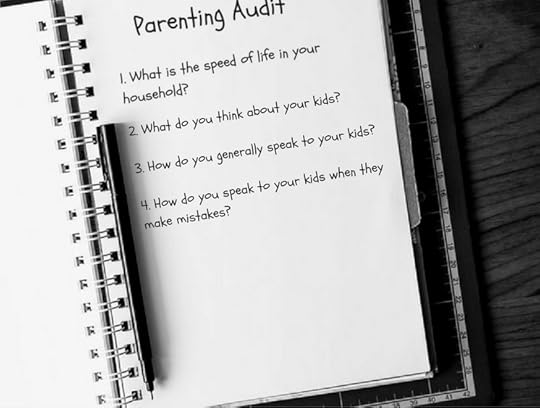
It’s been a few days since we turned the page on a new year, and it’s been fabulous seeing everyone setting goals and taking action. This is a great time to think about your work or business and how you can carve out more time for yourself. While “A new year, a new you” is a popular theme for “resolutions” at this time of the year, what is clearly lacking in many of those resolutions are any type of parenting goals.
While setting goals for health, financial abundance, and personal growth (yes, those are the top three) is a great way to work on our happiness and success, what truly influences our happiness index is the connection and relationship we have with our kids.
And although we are the “perfect” parents for our kids, we all have moments when we get stressed out and don’t exactly behave the way we would like around our children. We tell ourselves we can (and will) do better. And for a while, we keep that up. But how can we actually set parenting goals that help us ensure success? How can we match our intention of connection and relationship with our kids with our behavior?
One way to do that is to start the new year with a parenting audit of ourselves and our family. Begin by spending some time thinking about each of the below questions. You can write your answers on a separate sheet of paper, or print out this blog and write them in the empty space after each question.
What is the speed of life in your household?
– Slow and calm?
– Relaxed or rushed?
– Always busy and overscheduled?
What do you think about your kids? Of course, you love them, but do you…
– Accept them in your heart as they are?
– Constantly want them to improve?
– Compare them to other kids?
How do you generally speak to your kids?
– Are your words respectful or demanding?
– Is your tone of voice kind or unkind?
How do you speak to your kids when they make mistakes?
– Are you bossy or understanding?
– Are you able to have discussions or talks, or do you argue a lot?
How do you speak about your kids to others and refer to them on social media?
– Are you empathetic or do you complain about them?
– Are you sarcastic and condescending?
– Do you shame them?
How do your kids respond to you?
– Are they respectful or rude?
– Do they listen to what you’re saying or roll their eyes?
– Do they follow directions or just ignore you?
Consider your answers after you’ve written them down. And be sure to come back next week when we examine the range of answers and reveal some tips and tools for doing better.
The post 2018 Parenting Audit – Part 1 appeared first on Tools of Growth.
December 22, 2017
Stress-free Holidays: Parenting with L.O.V.E.

It starts just before Thanksgiving when we suddenly realize how much we have to do and begin to worry about how we are going to get everything done before Christmas or the end of the year. We all have expectations as to how the holiday season will go, and we strive to make it better than we did last year.
Parents are under tremendous stress at this time—with not enough time and often not enough money—trying to keep up with our extended family, friends, and neighbors. We become so caught up in decorating, shopping, cooking, and wrapping gifts that we don’t even realize we are teaching our children that a holiday has to achieve some imagined perfection while exhausting us at the same time. We become attached to the way things “should” be, rather than being content with the way things are.
Being stressed out is a disservice to the holiday season. This is a time to be joyous and celebratory. It’s a time to come together with our families and community, yet too often we are derailed from the true essence of the holiday by our to-do list and a host of self-imposed expectations.
Last week I had the chance to sit down with Dr. Nelly Farnoody for a special episode of “MomTalk LA,” where we discussed how we can better manage stress and be more mindful over the holidays.
I encourage you to spend time watching it if you are feeling overwhelmed by the season. Above all, use LOVE to inspire mindfulness during your holiday season.
L – Listen mindfully and intentionally. When you’re tired or losing your cool, pause and ask yourself, “How am I feeling right now?” Listen mindfully and intentionally to the answer, and take a break. Otherwise your family will bear the brunt of your emotional spillover. It is up to you to set the tone for a calm, peaceful, and joyous holiday.
O – Be open-minded and open-hearted. Make the effort with your children and family members to listen and truly hear what they say. Don’t get stuck on opinions and ideas that don’t serve the spirit of your heart. Who says you have to do the same thing every year? Be flexible and up for change and suggestions. When we listen mindfully and intentionally, it opens our mind to understand another person better. And understanding others opens our hearts and creates connections. Isn’t that what the spirit of the season is about?
V – Be a vehicle for compassion and kindness. When kids or other family members are having a difficult moment, open your mind and heart to compassion and kindness. Balance their emotions with a response that helps them get through this happy yet highly stressful time. Experience the simple joys of the holidays by cuddling with your kids, sharing hot cocoa or tea, or just being together. This helps us create unforgettable memories.
E – Embrace the moment for what it is. Whether the moment is good, bad, or ugly, accept it. If a child or family member is letting off steam, choose not to jump into their emotional reaction. More importantly, don’t add more negativity to the moment by gossiping about it or talking about someone behind his or her back. Simply embrace the moment with an “it is what it is” attitude. Accept it with no resistance. As I say in my book, The “Perfect” Parent, perfection is what has shown up in the moment. What makes it feel imperfect is our resistance.
And during this small holiday window of time off, block out ten minutes to reflect on the past year and what its learning experiences were for you. Ask your kids to do the same, and I promise you’ll hear things that you missed during the year. It’s a great way to learn, grow, and enhance communication.
While you’re sharing those stories with your kids, talk about the recent national natural disasters and how the children of families affected by those disasters are celebrating. Let them know that having fewer things does not define happiness. What’s important is the support and love extended to those families from each other and from friends, community, and the nation as a whole. This might segue into how your kids or your family can reach out and continue to help.
To sum up, I would like to take this moment to express not only my joy but also my sincere gratitude for your support and advocacy and for being part of our Tools Of Growth family. From our family to yours, wishing you and your loved ones a very Happy Holiday Season and a Joyful 2018.
The post Stress-free Holidays: Parenting with L.O.V.E. appeared first on Tools of Growth.


